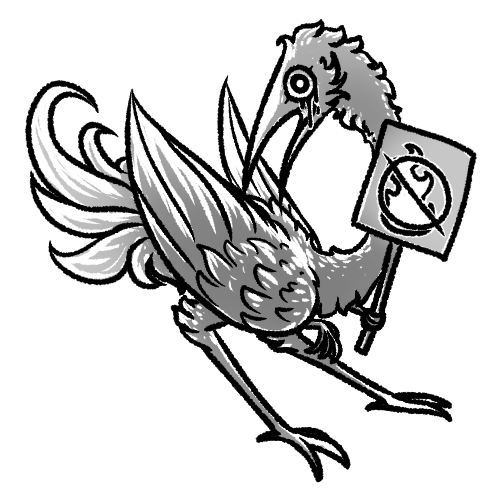[Cosmosdex] The Universal Encyclopedia
[Cosmosdex]
Muse
Devil's Advocate / Double Agent
Muse

Art by, Chipper
- Strength-1
- Intelligence-3
- Charisma-2
- Endurance-1
- Agility-1
- Luck-5
Type: Safe
Danger Level: Safe
Commonly Infects: Intelligent species
Attack Method: The muse strain cannot attack; it relies on the self-preservation of the host to avoid danger.
Summary: The muse strain infects the brain of victims, turning them into clockwork sympathisers who will frustrate local clockwork control efforts. They will spread misinformation that tricks people into becoming infected, aid and feed vulnerable stationery clockwork strains, and sabotage eradication attempts.
Original Creator: Schazer
 This work is licensed under a Creative Commons Attribution-ShareAlike 4.0 International License.
This work is licensed under a Creative Commons Attribution-ShareAlike 4.0 International License.Physical Description
The muse strain is impossible to visually detect, triggering few to no external changes in an affected individual. Friends or other people close to the infected, familiar with their demeanour, may notice subtle changes: posture or vocal register may shift, in a manner consistent with a boost of confidence or starting work at a new job that fills one with a sense of purpose.
A muse aware of their situation will, however, behave in whatever manner allows them to evade notice. There are no "tells" to reliably detect a muse, beyond invasive brain biopsies to extract a sample of infected tissue. Anyone claiming otherwise is a suspected muse, trying to confuse or deceive a listener with conflicting information.
Behavior
Accessories to massacres, abetters of atrocity. The presence of a muse immediately complicates any clockwork outbreak response, as they will appear by all accounts a normal civilian. Beneath their calm exterior, however, muses burn with a zealous desire to see all living things consumed by the clockwork virus. In an outbreak, muses will lead strangers into a clockwork's waiting jaws, poison emergency water supplies with cetus strains, and sabotage the equipment of first respondents.
Muses do not sit idly by until an outbreak arises near them - a fact considered by most to be both curse and blessing. While it has been historically easy to notice when an acquaintance suddenly starts encouraging people to "go drink that red sap out of that weird tree in the woods", muses have gotten smarter, more cunning, and more subtle in their machinations to ensure their own survival.
Muses will use whatever techniques are available to "soften up" a population, making them more susceptible to an infection when it does hit. The proliferation of internet throughout the universe has been an incredible boon for muse-led misinformation campaigns, who may do things like suggest bogus "clockwork-repelling" techniques to lull otherwise-vigilant individuals into a false sense of security.
Some muses are even more subtle when there's no work to be done yet in their immediate surrounds - sowing discord, spurring cultist attitudes and general suspicion of the Other, weakening a society's capacity to rally together when the virus makes its way to their shores.
Muses rarely spread their own strain (see trivia below), but can do so through sharing of bodily fluids.
Subtypes
Euterpe: Muse subtypes are difficult to identify in situ, as a substrain's specific influence on an infected individual's personality is often subtle. Certain strains, such as euterpe, have been isolated through brain autopsies due to the distinct patterns of infected tissue through the host. Euterpe amplifies a host's creative faculties, encouraging the creation of song, prose, and poetry which glorifies clockworks, infection, and becoming part of something grander than yourself by having your flesh assimilated. Euterpes are easily exterminated when their work achieves any amount of fame, though a more subtle integration of pro-clockwork themes and anonymity provided by the internet in the modern era keeps the strain alive.
Erato: The majority of muse subtypes do not aim to self-propagate via the muse's bodily fluids, as doing so would raise suspicion. Erato subtypes are a notorious exception, turning the infected into flirtatious socialites who turn their entire social circle into a small army of Muses who quietly await a local clockwork outbreak.
The most fearsome erato ingratiate themselves in high society, with the goal of seducing and infecting high-ranking officials whose sweeping institutional power can aid the spread of infection.
Melpomene: A hypothesised muse substrain, believed to have surfaced with the proliferation of social media. The melpomene-infected individual will never be so direct as to praise clockworks, but will cultivate in all those who heed them a negative outlook and depressive attitude. This is considerably easier when the circumstances around a melpomene and its victims are truly despairing, often invoking limboist rhetoric to highlight the general brutality and cheapness of life in the universe. The overall effect would be to make people simply give up when faced with a clockwork infection.
Special
Propagandist: Individuals infected with the muse strain become unwitting accessories to the spread of clockwork infections - this does not seem to dramatically alter their original personality, simply rewire their priorities so they consider it right and proper that everyone they know has their flesh integrated into an abomination of meat and metal.
Trivia
• Muse strains were, at one point, considered a harmless "safe" strain with few downsides for clockwork-hunters and other frontline crew to inoculate themselves with, as other clockworks would be dissuaded from eating the affected individual. This practice came to an abrupt end after several high-profile cases of muse-infected clockwork hunters being the only survivor of catastrophic containment failures.
• Muses are reluctant to spread their own strain to new hosts - most likely to escape detection - preferring to aid in the proliferation of more aggressive strains. Muses cannot be trusted to be predictable, however - The Breach of Cliopol, a quarantine violently ended in the shut-down city of Cliopol, where desperate civilians, self-infected with a muse's blood to avoid consumption by the violent strain they were sealed in with, rallied and overpowered the Q-classes maintaining the perimeter.
• The current extent of muse infection through civilised space is unknown. Different studies will list varying prevalence rates, though a controversial study of online social platforms estimated, based on conduct, that 1% of the universal population were harbouring the strain. It is unknown how much of the 1% reported are people pretending to support clockworks.
Image Gallery
No art currently, maybe you can help.

